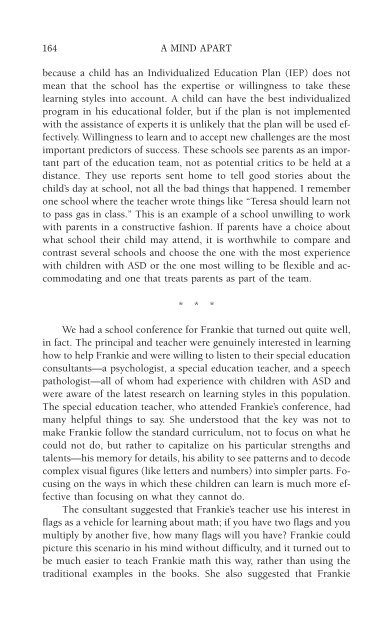978-1572305441
autism
autism
Create successful ePaper yourself
Turn your PDF publications into a flip-book with our unique Google optimized e-Paper software.
164 A MIND APART<br />
because a child has an Individualized Education Plan (IEP) does not<br />
mean that the school has the expertise or willingness to take these<br />
learning styles into account. A child can have the best individualized<br />
program in his educational folder, but if the plan is not implemented<br />
with the assistance of experts it is unlikely that the plan will be used effectively.<br />
Willingness to learn and to accept new challenges are the most<br />
important predictors of success. These schools see parents as an important<br />
part of the education team, not as potential critics to be held at a<br />
distance. They use reports sent home to tell good stories about the<br />
child’s day at school, not all the bad things that happened. I remember<br />
one school where the teacher wrote things like “Teresa should learn not<br />
to pass gas in class.” This is an example of a school unwilling to work<br />
with parents in a constructive fashion. If parents have a choice about<br />
what school their child may attend, it is worthwhile to compare and<br />
contrast several schools and choose the one with the most experience<br />
with children with ASD or the one most willing to be flexible and accommodating<br />
and one that treats parents as part of the team.<br />
* * *<br />
We had a school conference for Frankie that turned out quite well,<br />
in fact. The principal and teacher were genuinely interested in learning<br />
how to help Frankie and were willing to listen to their special education<br />
consultants—a psychologist, a special education teacher, and a speech<br />
pathologist—all of whom had experience with children with ASD and<br />
were aware of the latest research on learning styles in this population.<br />
The special education teacher, who attended Frankie’s conference, had<br />
many helpful things to say. She understood that the key was not to<br />
make Frankie follow the standard curriculum, not to focus on what he<br />
could not do, but rather to capitalize on his particular strengths and<br />
talents—his memory for details, his ability to see patterns and to decode<br />
complex visual figures (like letters and numbers) into simpler parts. Focusing<br />
on the ways in which these children can learn is much more effective<br />
than focusing on what they cannot do.<br />
The consultant suggested that Frankie’s teacher use his interest in<br />
flags as a vehicle for learning about math; if you have two flags and you<br />
multiply by another five, how many flags will you have? Frankie could<br />
picture this scenario in his mind without difficulty, and it turned out to<br />
be much easier to teach Frankie math this way, rather than using the<br />
traditional examples in the books. She also suggested that Frankie



